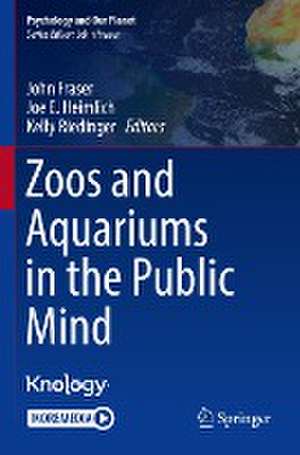Zoos and Aquariums in the Public Mind: Psychology and Our Planet
Editat de John Fraser, Joe E. Heimlich, Kelly Riedingeren Limba Engleză Paperback – 17 ian 2024
Among the topics discussed:
- History of zoo and aquarium development
- The role of zoos and aquariums in environmental literacy
- Empathy development at zoos
- Applying behavior change theories to the zoo visitor’s experience
- Social radiation of ideas from cultural institutions
| Toate formatele și edițiile | Preț | Express |
|---|---|---|
| Paperback (1) | 885.49 lei 6-8 săpt. | |
| Springer International Publishing – 17 ian 2024 | 885.49 lei 6-8 săpt. | |
| Hardback (1) | 891.33 lei 6-8 săpt. | |
| Springer International Publishing – 17 ian 2023 | 891.33 lei 6-8 săpt. |
Preț: 885.49 lei
Preț vechi: 1079.86 lei
-18% Nou
Puncte Express: 1328
Preț estimativ în valută:
169.46€ • 175.58$ • 141.43£
169.46€ • 175.58$ • 141.43£
Carte tipărită la comandă
Livrare economică 21 martie-04 aprilie
Preluare comenzi: 021 569.72.76
Specificații
ISBN-13: 9783030849443
ISBN-10: 3030849449
Pagini: 178
Ilustrații: XVII, 178 p. 25 illus., 5 illus. in color.
Dimensiuni: 155 x 235 mm
Greutate: 0.29 kg
Ediția:1st ed. 2023
Editura: Springer International Publishing
Colecția Springer
Seria Psychology and Our Planet
Locul publicării:Cham, Switzerland
ISBN-10: 3030849449
Pagini: 178
Ilustrații: XVII, 178 p. 25 illus., 5 illus. in color.
Dimensiuni: 155 x 235 mm
Greutate: 0.29 kg
Ediția:1st ed. 2023
Editura: Springer International Publishing
Colecția Springer
Seria Psychology and Our Planet
Locul publicării:Cham, Switzerland
Cuprins
Foreword.- 1. Established facts about how zoos and aquariums work in mental process.- 2. Trust and favorability.- 3. What is the STEM learning ecology and where do zoos and aquariums fit in it? Insights from a National Study of the Public’s Engagement with Science, Technology, Engineering, and Math.- 4. Basics of behavior change.- 5. Family talk at Live Animal Exhibits: From Biological to Ecological to Conservation Talk.- 6. Critical environmental literacy and the role of zoos and aquariums: A Radical Proposition.- 7. Can we nudge them? Conservation talk under different interpretive conditions.- 8. Social radiation of ideas from cultural institutions.- 9. Visitor behavior, choice, conservation conversations and meaning-making: Tracking visitor groups with GoPro Cameras.- 10. Visitor agendas and preconceptions about learning.- 11. Empathy development at zoos.- 12. Contributions to biodiversity awareness:An update on achieving Aichi target 1.
Notă biografică
John Fraser, Ph.D. AIA is a conservation psychologist who has dedicated over 30 years to exploring the role of zoos and aquariums in society. He is President & CEO of Knology, a past president of the Society for Environment, Population, and Conservation Psychology, Editor of Curator: the Museum Journal, and editor of this book series.
Joe E. Heimlich, Ph.D. is Sr. Director for Research for the Center of Science and Industry (COSI) and a researcher in COSI’s Center for Research and Evaluation where he studies informal learning in zoos, nature centers, science centers, and other museums. He is also Professor Emeritus with Ohio State University.
Kelly Riedinger, Ph.D. is a Senior Researcher and program lead in informal, K-12 and connected learning for the STEM Research Center at Oregon State. Kelly has been involved in the zoo/aquarium field as a practitioner, researcher and evaluator for 20 years.
Joe E. Heimlich, Ph.D. is Sr. Director for Research for the Center of Science and Industry (COSI) and a researcher in COSI’s Center for Research and Evaluation where he studies informal learning in zoos, nature centers, science centers, and other museums. He is also Professor Emeritus with Ohio State University.
Kelly Riedinger, Ph.D. is a Senior Researcher and program lead in informal, K-12 and connected learning for the STEM Research Center at Oregon State. Kelly has been involved in the zoo/aquarium field as a practitioner, researcher and evaluator for 20 years.
Textul de pe ultima copertă
This book summarizes a range of psychological research into how zoos and aquariums operate in the minds of visitors and the broader public. Bringing together core findings from emerging international research, the book provides data-based summaries that situate the content in the larger context of how cultural institutions shape public understanding. The focus of this book is to bring into a single resource, the major strains of research that have explored how zoos and aquariums are situated in public consciousness, to ground the discourses around what zoos and aquariums do in the empirical data and evidence, and to find opportunities to summarize well-established fact to support future research expanding on the known.
Among the topics discussed:
- History of zoo and aquarium development
- The role of zoos and aquariums in environmental literacy
- Empathy development at zoos
- Applying behavior change theories to the zoo visitor’s experience
- Social radiation of ideas from cultural institutions
Caracteristici
Examines how zoos and aquariums impact public behavior and opinion about the environment Acts as an overview of psychological approaches to zoos for industry professionals Consolidates research that has been scattered across the journal ecology without a logical disciplinary focus


